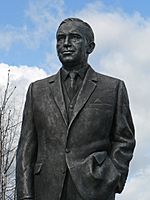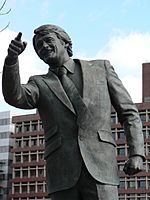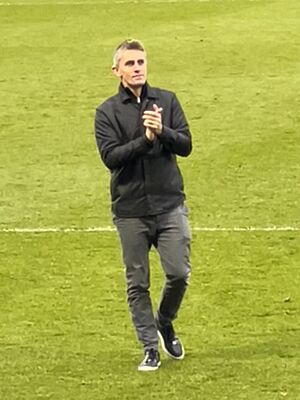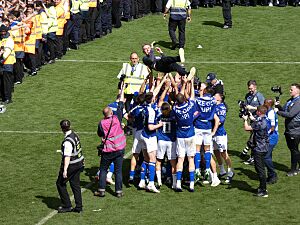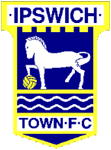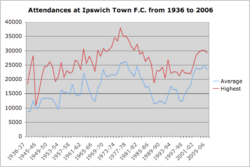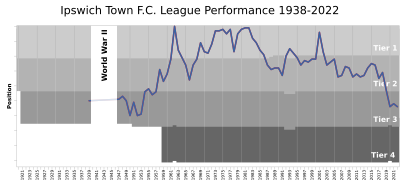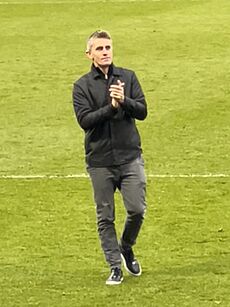Ipswich Town F.C. facts for kids
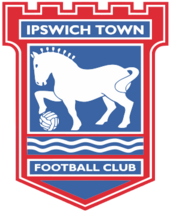 |
||||
| Full name | Ipswich Town Football Club | |||
|---|---|---|---|---|
| Nickname(s) | The Blues The Tractor Boys |
|||
| Founded | 16 October 1878 | |||
| Ground | Portman Road | |||
| Capacity | 30,056 | |||
| Owner | Gamechanger 20 Ltd | |||
| Chairman | Mark Ashton | |||
| Manager | Kieran McKenna | |||
| League | League One | |||
| 2018–19 | Championship, 24th of 24 (relegated) | |||
|
||||
Ipswich Town Football Club is a professional football team from Ipswich, Suffolk, England. They are often called "The Blues" or "The Tractor Boys." The club plays its home games at Portman Road.
Ipswich Town started in 1878 as an amateur team. They became professional in 1936 and joined the Football League in 1938. The club has won some major trophies. They won the league title in 1961–62, which was their first season in the top league. They also won the FA Cup in 1978 and the UEFA Cup in 1981. Ipswich Town has a great record in European games, never losing at home. They have beaten famous teams like Real Madrid and AC Milan.
The team's traditional colours are blue shirts, white shorts, and blue socks. Ipswich Town has a big rivalry with Norwich City. Their matches are known as the East Anglian derby.
Contents
- A Look Back: Ipswich Town's Journey
- Starting Out: From Amateurs to Pros (1878-1954)
- Reaching the Top: First Division Glory (1954-1963)
- Ups and Downs: After Ramsey's Departure (1963-1969)
- The Golden Years: Bobby Robson's Time (1969-1982)
- Tough Times and a Return to the Top (1982-1994)
- More Challenges and a Big Comeback (1994-2002)
- Staying Strong in the Championship (2002-2019)
- The Climb Back: From League One to Premier League (2019-Present)
- Team Badge and Kit Colours
- Portman Road: Ipswich Town's Home Stadium
- Ipswich Town Fans
- Club Records and Statistics
- Players
- Club Leadership
- Managers of Ipswich Town
- Club Achievements
- Ipswich Town Football Club Women
- See also
A Look Back: Ipswich Town's Journey
Starting Out: From Amateurs to Pros (1878-1954)
Ipswich Town Football Club began in 1878 as an amateur team called Ipswich A.F.C. In 1888, they joined with Ipswich Rugby Club to form Ipswich Town Football Club. The team won several local cups, like the Suffolk Challenge Cup.
They played in different local leagues before joining the Southern Amateur League in 1907. Ipswich won this league four times. In 1936, the club became professional and joined the Southern League, which they won in their first season.
On May 30, 1938, Ipswich joined the Football League. They played in the Third Division South until 1954. That year, they won the title and were promoted to the Second Division.
Reaching the Top: First Division Glory (1954-1963)
After being promoted, Ipswich was relegated back to the Third Division South the next year. But things changed when Alf Ramsey became manager in August 1955.
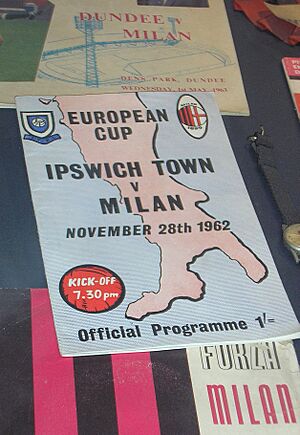
Ramsey led the team to win the Third Division South title again in 1956–57. They then moved up to the Second Division. In 1960–61, Ipswich won the Second Division championship. This meant they were promoted to the First Division, the top league in English football.
In their very first season in the top league, 1961–62, Ipswich became champions of England! This amazing win qualified them for the 1962–63 European Cup. They beat Floriana from Malta but then lost to AC Milan. Alf Ramsey left the club in April 1963 to manage the England national team. He later led England to win the World Cup in 1966 and was made a Sir.
Ups and Downs: After Ramsey's Departure (1963-1969)
After Alf Ramsey left, Jackie Milburn became the new manager. The team's performance dropped. Just two years after winning the league, Ipswich was relegated to the Second Division in 1964. They let in 121 goals in 42 games, which was one of the worst defensive records ever.
Milburn left after one season, and Bill McGarry took over in 1964. The club stayed in the Second Division for four years. McGarry helped Ipswich get promoted back to the First Division in the 1967–68 season. In January 1969, Bobby Robson became the new manager.
The Golden Years: Bobby Robson's Time (1969-1982)
Under Bobby Robson, Ipswich Town won two major trophies and played in European competitions many times. In 1973, they won the Texaco Cup and finished fourth in the league, qualifying for the UEFA Cup. In 1974–75, they reached the semi-finals of the FA Cup and finished third in the league.
By the late 1970s, Robson had built a very strong team. They had talented players like John Wark, Terry Butcher, and Paul Mariner, along with Dutch stars Arnold Mühren and Frans Thijssen. Ipswich often finished in the top five of the league and played in the UEFA Cup.
Their biggest success came in 1978 when Ipswich beat Arsenal at Wembley Stadium to win their only FA Cup trophy. In the 1980–81 season, Ipswich almost won three major titles. They led the top division for most of the season and were also in the FA Cup and UEFA Cup. However, injuries and many games meant they finished second in the league to Aston Villa and reached the FA Cup semi-finals. But they did win the UEFA Cup in 1981, beating AZ Alkmaar 5–4 in the final. They also finished second in the league again in 1981–82.
Bobby Robson's success with Ipswich made bigger clubs notice him. In July 1982, he left Ipswich to become the manager of the England national team.
Tough Times and a Return to the Top (1982-1994)
Bobby Ferguson, Robson's assistant, took over as manager. Ipswich finished in the middle of the table for two seasons, but then their performance got worse. The club also had less money because of a new expensive stand at Portman Road.
Ipswich was relegated to the Second Division at the end of the 1985–86 season. Ferguson left in May 1987 after the team failed to get back into the First Division. John Duncan managed Ipswich for three years. Then, John Lyall became manager in May 1990.
Lyall led Ipswich to win the Second Division title in 1991–92. This meant they were promoted to the new FA Premier League for the 1992–93 season. Ipswich started well and were fourth in the Premier League in January 1993. However, their form dropped, and they finished 16th. The next season was also tough, and Ipswich barely avoided relegation. Lyall was sacked in December 1994 when the club was at the bottom of the league.
More Challenges and a Big Comeback (1994-2002)
George Burley became the new manager, but he couldn't improve the team's results. Ipswich suffered a huge 9–0 defeat against Manchester United and was relegated.
Back in the second tier, Burley led the club to the promotion playoffs three times in a row, but they lost in the semi-finals each time. Finally, in 2000, Ipswich returned to the Premier League. They beat Barnsley 4–2 in the playoff final at Wembley Stadium.
Ipswich did very well in their first Premier League season, finishing an impressive fifth. They just missed out on a Champions League spot but qualified for the UEFA Cup. George Burley also won the FA Premier League Manager of the Year award.
However, the next season was not as good. The team won only one of their first seventeen league games and were at the bottom by December. Despite a good run in January and February, Burley couldn't save the club from relegation back to the Championship. The club also faced financial problems. Burley was sacked in October 2002 after almost eight years as manager.
Staying Strong in the Championship (2002-2019)
Joe Royle became the new manager in October 2002. He helped the team improve and almost reached the playoffs. In the 2003–04 season, the club came out of financial administration. They finished fifth but lost to West Ham United in the playoff semi-finals.
In 2004–05, Ipswich again reached the playoffs but lost to West Ham United. The 2005–06 season saw Ipswich finish 15th, their lowest finish since 1966. Joe Royle resigned in May 2006, and Jim Magilton became the new manager.
In December 2007, businessman Marcus Evans took over the club, investing about £44 million. The Marcus Evans Group became the club's main sponsor until 2018.
Magilton was sacked in April 2009. Roy Keane, a former Manchester United player, took over. Keane's time as manager ended in January 2011. Paul Jewell then became manager. After a very poor start to the 2012–13 season, Jewell left in October 2012.
Mick McCarthy was appointed manager in November 2012. He helped Ipswich avoid relegation, moving them from the bottom to 14th place. In the 2014–15 season, they finished sixth and reached the playoffs but lost to Norwich City. McCarthy left the club in April 2018.
Paul Hurst became manager in May 2018 but was sacked in October after a bad start. Paul Lambert took over, but he couldn't stop Ipswich from being relegated to League One at the end of the 2018–19 season. This ended Ipswich's 63-year stay in the top two leagues of English football.
The Climb Back: From League One to Premier League (2019-Present)
Paul Lambert stayed as manager for Ipswich's first season in the third tier since 1957. They finished 11th, their lowest finish since 1953. The season ended early due to the COVID-19 pandemic. Lambert left in February 2021, and Paul Cook became the new manager.
In April 2021, a US investment group called Gamechanger 20 Limited bought most of the club. Former owner Marcus Evans remained a small shareholder.
Ipswich finished ninth in the 2020–21 season, missing the playoffs. Expectations were high for the next season, but after disappointing results, Cook was sacked in December 2021. On December 16, 2021, Kieran McKenna, a coach from Manchester United, was appointed to replace Cook. Ipswich finished the 2021–22 season in 11th place.
McKenna's first full season was much more successful. Ipswich had an 18-game unbeaten streak and broke several club records. They were promoted back to the Championship as runners-up in the 2022–23 season, finishing with 98 points and scoring 101 league goals.
After winning their final league game of the 2023–24 season, Ipswich achieved back-to-back promotions. They became only the fifth team to do this. They were promoted as runners-up to the Premier League, ending their 22-year absence from the top league. They finished with 96 points and scored 92 goals.
Ipswich's return to the top league in the 2024–25 season was short. They spent most of the season in the bottom half and in the relegation zone. On April 26, 2025, after losing to Newcastle United, Ipswich's relegation back to the Championship was confirmed after just one year in the top flight.
Team Badge and Kit Colours
Club Badge
Ipswich Town's shirts didn't have a badge until the mid-1960s. They first used a design based on the Ipswich town coat of arms. In 1972, a new badge was designed after a competition. This new badge was meant to represent the local area.
The badge features a Suffolk Punch horse, which is a strong local breed. It also includes parts of the Wolsey Gate, a historic building in Ipswich, and waves to show the town's connection to the sea and docks. This badge was used again in the 2020–21 season to celebrate 40 years since Ipswich won the UEFA Cup.
In 1995, the badge was updated. The Wolsey Gate turrets were moved, the background colour changed, and the horse looked more powerful. Three stars were added to the team's shirts in 2004–05. These stars represent the three major trophies Ipswich Town has won: the FA Cup, the UEFA Cup, and the old First Division title. The stars have moved around on the shirt over the years.
|
|
| Ipswich's orange away kit used during the 1999–2000 season |
Team Colours
Ipswich Town's main home colours are blue shirts, white shorts, and blue socks. This is why one of their nicknames is "The Blues." When the club became professional in 1936, they started wearing all-blue shirts and white shorts. These have been their main home colours ever since.
For away games, Ipswich has used many different colours. These include white, orange, red and black stripes, claret and green, and dark blue and claret. In 2006, the club gave 500 old orange and blue-and-white shirts to children in Iraq.
Kit Makers and Sponsors
In 1981, Ipswich Town got its first official sponsor, a Japanese electronics company called Pioneer Corporation. Pioneer also sponsored the West Stand at Portman Road until 1999. They sponsored the club's kits until 1985.
After Pioneer, local radio station Radio Orwell sponsored the kits for one season. Then, Fisons, a chemical company, became the main sponsor from 1986 to 1995. This included the 1991–92 season when Ipswich won the Second Division and got promoted to the new Premier League.
Since then, Ipswich has had many kit sponsors, including Greene King (1995–2001) and energy companies like TXU Energi (2001–2003), Powergen (2003–2006), and E.ON (2006–2008). After Marcus Evans took over the club in 2007, his company, Marcus Evans Group, became the main sponsor from 2008 to 2018.
In 2018, British online casino company Magical Vegas became the sponsor. In May 2020, Magical Vegas gave their shirt sponsorship rights for the 2020–21 season to The Carers Trust charity. On May 6, 2021, famous artist and Ipswich fan Ed Sheeran became the club's new shirt sponsor. This deal was extended until the end of the 2024–25 season. In June 2022, Ipswich announced a 4-year deal with Umbro to make their kits again, for the first time since 1995.
| Period | Kit manufacturer | Shirt sponsor | Secondary shirt sponsor | Shorts sponsor |
|---|---|---|---|---|
| 1975–1977 | Umbro | — | — | — |
| 1977–1981 | Adidas | |||
| 1981–1985 | Pioneer | |||
| 1985–1986 | Radio Orwell | |||
| 1986–1989 | Fisons | |||
| 1989–1995 | Umbro | |||
| 1995–2001 | Punch | Greene King | ||
| 2001–2003 | TXU Energi | |||
| 2003–2006 | Powergen | |||
| 2006–2007 | E.ON | |||
| 2007–2008 | Mitre | |||
| 2008–2014 | Marcus Evans Group | |||
| 2014–2017 | Adidas | |||
| 2017–2018 | East Anglian Children's Hospices | |||
| 2018–2019 | Magical Vegas | Nicholas Estates | ||
| 2019–2020 | East Anglian Air Ambulance | |||
| 2020–2021 | Carers Trust | Thank You NHS | Mortgagemove | |
| 2021–2022 | +–=÷× Tour (Ed Sheeran) | |||
| 2022–2025 | Umbro | Ipswich Town Foundation |
Portman Road: Ipswich Town's Home Stadium
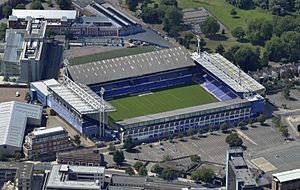
Ipswich Town has played at Portman Road since 1884. It's their home stadium. In 1890, Ipswich was one of the first clubs to use goal nets. The first wooden stand was built in 1905. During World War I, the British Army used the ground.
When the club became professional in 1936, they started building terraces for fans to stand on. By 1954, all sides of the stadium had terraces. In 1959, floodlights were put up for night games.
Over the years, the stadium was improved. The Portman Stand was built in 1971. The West Stand was made bigger in 1982 and later became all-seating in 1990. After the Hillsborough disaster in 1989, all stadiums in England had to become all-seater. Portman Road became the first fully all-seater stadium in the top league in 1992, with a capacity of 22,600.
More success on the field led to more stadium improvements. Over £22 million was spent to rebuild the North and South stands. This made the stadium's current capacity 30,311, making it the largest football stadium in East Anglia.
Statues of former managers Sir Alf Ramsey and Sir Bobby Robson have been placed outside the stadium. The North Stand was renamed the Sir Bobby Robson Stand in 2009. In 2012, the South Stand was renamed the Sir Alf Ramsey Stand. This means Portman Road now has two stands named after its most successful managers. The West Stand was renamed the East of England Co-operative Stand in 2012, but it returned to being simply the West Stand in 2021. The East Stand is called the Cobbold Stand, named after the club's former owners.
The playing field at Portman Road is known for being very good. It has won awards for being the best pitch in the league many times. The stadium has also hosted international youth matches and one senior England friendly game in 2003.
Ipswich Town Fans
A common nickname for Ipswich Town fans is "The Tractor Boys." This name became popular when the team was in the Premier League from 2000 to 2002. It's a funny way to refer to Suffolk's farming background. The nickname might have started when Leeds United fans chanted, "We're being beaten by a bunch of tractor drivers" during a game in 2000–01. Fans of bigger clubs would sometimes chant "1–0 to the Tractor Boys" to tease Ipswich.
Ipswich has fans all over the world. The official Ipswich Town Supporters Club has branches in many countries. The club has a special friendship with German club Fortuna Düsseldorf. Fortuna fans visit Portman Road every year, and Ipswich fans visit Düsseldorf to support Fortuna. The two clubs have even played friendly matches together.
Rivalries
Ipswich Town's main rivals are Norwich City. Their matches are called the East Anglian derby, or sometimes the "Old Farm derby." This is a funny reference to the "Old Firm Derby" between Celtic and Rangers in Scotland, and it highlights the importance of farming in East Anglia. The rivalry started in the early 1900s when both clubs were amateur. The first professional derby was in 1939. Fans of both clubs often claim the title "Pride of Anglia" for their team, based on who wins the derby, finishes higher in the league, or has a better history.
Club Records and Statistics
Mick Mills holds the record for the most league appearances for Ipswich, playing 741 games between 1966 and 1982. The club's top league goalscorer is Ray Crawford, who scored 203 goals from 1958 to 1969. Ted Phillips scored the most league goals in one season, with 41 goals in 1956–57. Allan Hunter earned the most international caps while playing for Ipswich, with 47 appearances for Northern Ireland.
Ipswich's biggest league wins have been 7–0 against Portsmouth in 1964, against Southampton in 1974, and against West Bromwich Albion in 1976. Their heaviest league defeats were 10–1 against Fulham in 1963 and 9–0 against Manchester United in 1995.
The record attendance at Portman Road is 38,010 for an FA Cup match against Leeds United on March 8, 1975. Because stadiums are now all-seater, this record is unlikely to be broken.
The highest fee Ipswich has received for a player is £8.1 million for Connor Wickham from Sunderland in June 2011. The most the club has spent on a player is £20 million for Omari Hutchinson from Chelsea in June 2024, after being promoted to the Premier League.
Bobby Robson managed Ipswich for the most games, 709 matches, between 1969 and 1982. Scott Duncan was the longest-serving manager in terms of time, managing the club for 6,487 days from 1937 to 1955.
Ipswich still has an amazing record of being undefeated at home in European competitions, with 31 home games without a loss. This record started in 1962.
Players
Current Squad
|
|
Club sponsor and minority shareholder Ed Sheeran is honourably issued squad number 17.
Young Talent: Under-21s and Academy
Ipswich has a Category Two Academy, which is a system for training young players. They plan to improve it to Category One. The academy is led by Bryan Klug. In the 1990s, the academy was very successful, producing many first-team players like Kieron Dyer, Richard Wright, and Titus Bramble. More recently, players like Connor Wickham, Jordan Rhodes, Luke Woolfenden, and Andre Dozzell have come from the academy. Andre Dozzell, like his father, scored on his debut at just 16 years old.
Player of the Year
At the end of each season, fans vote for their favourite player to be named 'Player of the Year'.
Hall of Fame
In 2007, the club started a Hall of Fame to honour important people connected to the club. The first members, Ray Crawford, Mick Mills, Ted Phillips, and John Wark, were chosen by a vote of former Ipswich players.
Club Leadership
Board of Directors
| Position | Name |
|---|---|
| Chairman | |
| Majority-Owner | |
| Minority-Owner | |
| Minority-Owner |
Club Management Team
| Position | Name |
|---|---|
| Chief Executive Officer | |
| Chief Operating Officer | |
| Chief Financial Officer | |
| Club Secretary |
First-Team Staff
| Position | Name |
|---|---|
| Manager | |
| Assistant Manager | |
| First-Team Coaches | |
| Goalkeeping Coaches | |
| Fitness Coach | |
| Director of Football Operations | |
| Director of Performance | |
| Head of Analysis | |
| Head of Recruitment | |
| Head of Athletic Performance | |
| Head Physiotherapist | |
| Head of Strength & Conditioning | |
| Sports Scientist | |
| Sports Therapist | |
| Kit Manager |
Academy Staff
Information correct as of June 5, 2025
Managers of Ipswich Town
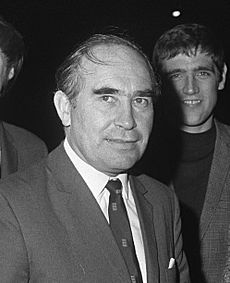
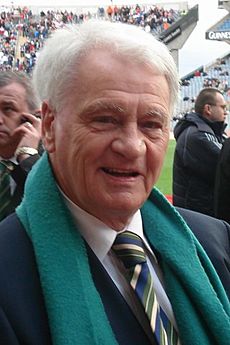
- As of May 25, 2025. Only permanent managers are shown.
| Name | Nationality | From | To | M | W | D | L | Win % |
|---|---|---|---|---|---|---|---|---|
| Mick O'Brien | 29 May 1936 | 11 August 1937 | 39 | 25 | 9 | 5 | 64.1 | |
| Scott Duncan | 12 November 1937 | 7 August 1955 | 505 | 205 | 113 | 187 | 40.6 | |
| Alf Ramsey | 8 August 1955 | 30 April 1963 | 369 | 176 | 75 | 118 | 47.7 | |
| Jackie Milburn | 1 May 1963 | 8 September 1964 | 56 | 11 | 12 | 33 | 19.6 | |
| Bill McGarry | 5 October 1964 | 23 November 1968 | 196 | 80 | 62 | 54 | 40.8 | |
| Bobby Robson | 13 January 1969 | 18 August 1982 | 709 | 316 | 173 | 220 | 44.6 | |
| Bobby Ferguson | 19 August 1982 | 17 May 1987 | 258 | 97 | 61 | 100 | 37.6 | |
| John Duncan | 17 June 1987 | 5 May 1990 | 161 | 73 | 29 | 59 | 45.3 | |
| John Lyall | 11 May 1990 | 5 December 1994 | 231 | 77 | 75 | 79 | 33.3 | |
| George Burley | 28 December 1994 | 11 October 2002 | 413 | 188 | 96 | 129 | 45.5 | |
| Joe Royle | 28 October 2002 | 11 May 2006 | 189 | 81 | 48 | 60 | 42.9 | |
| Jim Magilton | 5 June 2006 | 22 April 2009 | 148 | 56 | 41 | 51 | 37.8 | |
| Roy Keane | 23 April 2009 | 7 January 2011 | 81 | 28 | 25 | 28 | 34.6 | |
| Paul Jewell | 13 January 2011 | 24 October 2012 | 86 | 30 | 18 | 38 | 34.9 | |
| Mick McCarthy | 1 November 2012 | 10 April 2018 | 279 | 105 | 78 | 96 | 37.6 | |
| Paul Hurst | 30 May 2018 | 25 October 2018 | 15 | 1 | 7 | 7 | 6.7 | |
| Paul Lambert | 27 October 2018 | 28 February 2021 | 113 | 37 | 28 | 48 | 32.7 | |
| Paul Cook | 2 March 2021 | 4 December 2021 | 44 | 13 | 17 | 14 | 29.5 | |
| Kieran McKenna | 20 December 2021 | Present | 173 | 81 | 47 | 45 | 46.8 |
Club Achievements
Domestic League Titles
- First Division (top league)
- Champions: 1961–62
- Runners-up: 1980–81, 1981–82
- Second Division / First Division / Championship (second league)
- Champions: 1960–61, 1967–68, 1991–92
- Runners-up: 2023–24
- Play-off winners: 2000
- Third Division South / League One (third league)
- Champions: 1953–54, 1956–57
- Runners-up: 2022–23
- Southern League
- Champions: 1936–37
Cup Wins
- FA Cup
- Winners: 1977–78
- Texaco Cup
- Winners: 1972–73
European Titles
- UEFA Cup
- Winners: 1980–81
Ipswich Town Football Club Women
Ipswich Town also has a women's team, Ipswich Town Women. They play in the Women's Super League 2, which is the second tier of women's football in England. They were promoted from the FAWNL South Division in the 2024–25 season. The women's team also has a very successful academy for young players. They play their home games at Dellwood Avenue in Felixstowe, and sometimes at Portman Road.
See also
 In Spanish: Ipswich Town Football Club para niños
In Spanish: Ipswich Town Football Club para niños


